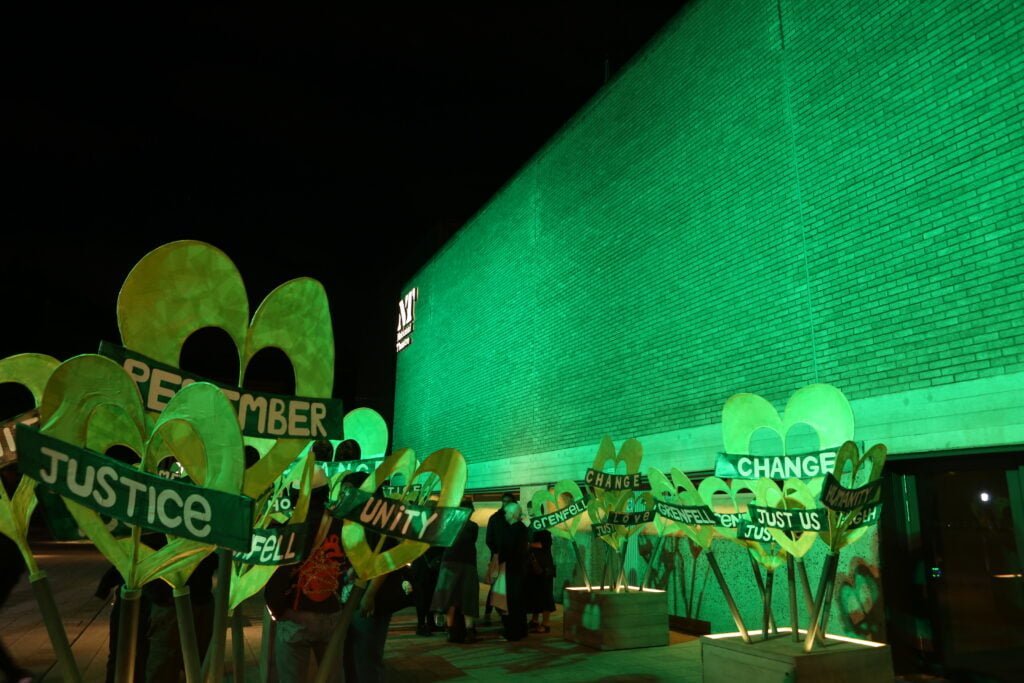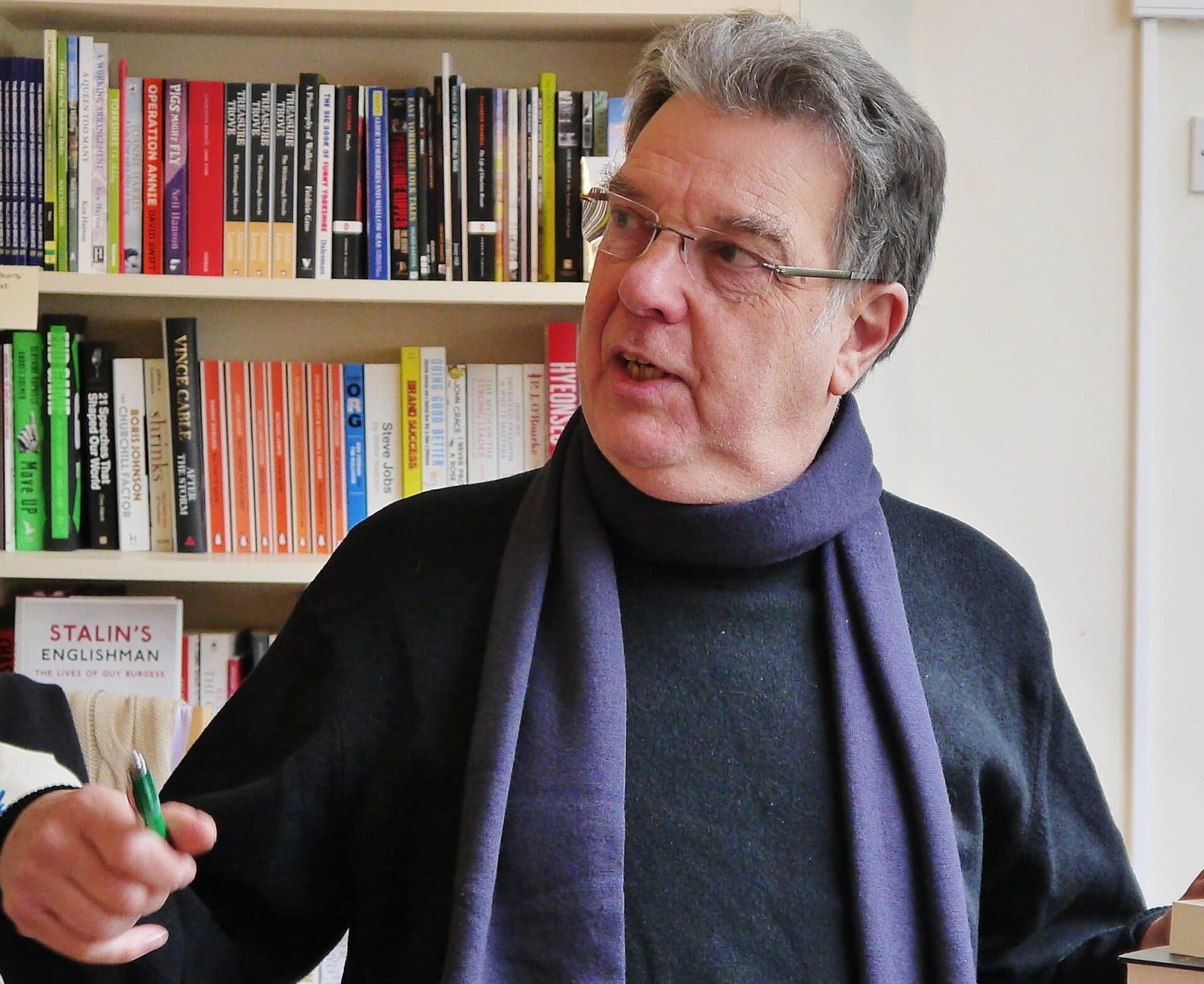The bonfire of regulations which caused a fire
“Prime Minister David Cameron said 100 standards and building regulations were facing the bonfire – a move which he claimed would save around £60 million a year for housebuilders – or £500 for each new home built. Criteria relating to the size of windows, sizes of rooms, and demands for renewable energy sources will face the cull.”
Architects Journal, January 2014.

Three years after David Cameron promised “a bonfire” of regulations, the Grenfell Tower burned down with the loss of 72 lives, because greedy contractors had been allowed to fit a cheap cladding which they knew was highly flammable.
For me, the most powerful moment in Grenfell: in the Words of the Survivors is when the actors stop speaking to listen to a video of Cameron promising an end to regulatory “burdens on business.” Of course Cameron, whose personal wealth is estimated at over £50 million, lives in a safe home. Cutting corners is only for the homes of the poor.
An internal memo in the company that made the cladding noted that, even though it was highly flammable, they could still sell it “in countries whose regulations are not so restrictive.”
It would be nice to think that Conservative politicians stopped demanding deregulation after the Grenfell fire. Sadly not: it turns out that deregulation is one of the “Brexit benefits” we are expecting.
As recently as last month, former Conservative Party chairman Sir Jake Berry (the “Sir” comes courtesy of Boris Johnson’s resignation honours list) told Newsnight:
“We can either be a high tax, high regulation country, a bit like our European neighbours. That works, but it doesn’t work if you’re outside the European club. I think when we made the decision to leave the EU back in 2016, part of that, that cry led from the north of England, was, let’s do things differently in Britain, let’s be more globally facing, let’s be a lower tax, low regulation, highly competitive economy.”
The theatre critic Kenneth Tynan once said that he did not think he could love anyone who did not want to see Look Back in Anger. I used to think it was a silly remark, but I am not sure I could like or respect, let alone love, anyone who could listen to these wealthy and complacent men sneering at regulation, and not feel a burning anger.
Gillian Slovo’s Grenfell: in the Words of the Survivors comes hard on the heels of Richard Norton-Taylor’s Grenfell – Value Engineering: Scenes from the Grenfell Inquiry. Personally, I preferred Norton-Taylor’s play, because it was consciously and deliberately not theatrical. It was, literally, an edited version of the enquiry itself, and the direction maintained the static, formal aura of a court. The revelations were the more shocking because they were delivered in an unemotional courtroom manner.
By contrast, Slovo’s work, and the directorial decisions of Phyllida Lloyd and Anthony Simpson-Pike, are elaborately theatrical. We open with a touchy-feely speech about how, any time we feel overcome, we can walk out into the comforting embrace of the theatre staff. Then an actor offers sweets to a few members of the audience. (I got one. I couldn’t get the wrapping off, and it lay in my pocket throughout the first act.) I’ve no objection to offering sweets to the audience, but I ought to be able to discern some dramatic purpose.

But when the play gets under way, it’s powerful stuff. In the National’s small, intimate Dorfman Theatre, with the audience all round the acting area, the scenery consisting only of a few cardboard boxes. First, the play recreates the life the survivors remember from before the Grenfell fire.
They didn’t think of themselves as poor – they were teachers, supermarket managers – and they had a good life, and cared about each other.
But those who controlled their lives had a very different view of them. When new boilers were installed in the flats, they were placed in the corridors. “How would you like the boiler in the corridor of your home?” one resident asked an official. He replied: “Well, if I was getting it for nothing, I wouldn’t mind” and the resident got a clear sense of her social status in the mind of that official. The windows were not made to fit properly. When the lift didn’t work, disabled residents were left to struggle up and down several stories as best they could.
And crucially, when residents said “that cladding isn’t safe” they were dismissed and patronised.
The play then gives us the night of the fire in the words of the survivors, and the ones they lost – in one case, her brother, sister-in-law, and their three children. This is the heart of the play, and it’s done with a controlled passion that makes it utterly heartbreaking.
It’s understandable that some survivors might see the firefighters as part of the establishment that dismissed them, but I have interviewed some of the Grenfell firefighters. They are tormented every day by the thought of those they could not save, and I know how hurt they have been by the accusations of casual racism that are repeated uncritically in this play.
But the balance is quickly redressed, as another survivor tells of how two firefighters rescued him, then ran back into the burning building. “Incredible!” he says.
This is a fine piece of theatre, and I urge you to go and see it. It is gripping, heartbreaking and very intense, and you will come away understanding with great clarity just why our society is broken.


Francis Beckett is an author, journalist, playwright and contemporary historian. He was the 2009 winner of the Ted Wragg Award for lifetime achievement in education journalism.
His latest two plays are A Modest Little Man (about Clement Attlee) and Vodka with Stalin.
Production Notes
Grenfell: In the words of survivors
Written by Gillian Slovo
Directed by Phyllida Lloyd, Anthony Simpson-Pike
Cast
Starring:
Ash Hunter
Houda Echouafni
Jackie Clune
Joe Alessi
Lisa Zahra
Michael Shaeffer
Pearl Mackie
Rachid Sabitri
Sarah Slimani
Keaton Guimarães-Tolley
Gaz Choudhry
Nahel Tzegai
Creatives
Director: Phyllida Lloyd, Anthony Simpson-Pike
Designer: Georgia Lowe
Lighting Designer: Azusa Ono
Sound Designer: Donato Wharton
Composers: Benjamin Hudson, Benjamin Kwasi Burrell
Information
Running Time: Three hours including an interval
Booking to 26th August 2023
Theatre:
Dorfman Theatre
National Theatre
Upper Ground
South Bank
London SE1 9PX
Rail/Tube : Waterloo
Telephone: 020 7452 3000
Website: nationaltheatre.org.uk
Reviewed by Francis Beckett
at the Dorfman
on 21st July 2022
